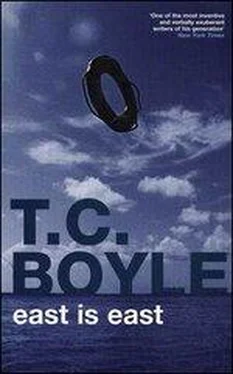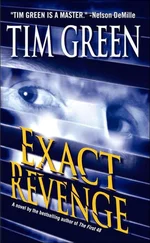She rattled the bag and turned her head to look at him. “I don’t want to keep you here against your will—really, Hiro, I don’t. Think of the risk I’m running just by harboring you. I like you, I do. I want to see you get out of here … it’s just—it’s not that easy, that’s all I’m saying. You don’t want to get caught, do you?”
He stood there looming over her, hands on his hips. He didn’t answer.
“She’s got an old Mercedes with a trunk the size of the Grand Canyon. It’d be ideal.” She showed him her perfect pink gums and irreproachable eyes, and suddenly the fight went out of him.
“Okay,” he said, dropping his eyes. “Soon, yes?”
“Soon,” she said.
And then, two nights later, she staggered up the steps with another load of canned goods, and he couldn’t help noticing her cryptic little smile. “I have a surprise for you,” she gasped, thumping across the room to fling herself at the desk and wriggle out of her backpack. She threw out her chest, narrowed her shoulders and eased the straps down her arms. He could smell her, a rich dark scent, perfume and sweat commingled.
“Surprise?” He edged closer, watching her hands as she loosed the string at the neck of the bag. He was expecting a treat—a wedge of cake or a Mars Bar maybe; she knew he loved Mars Bars—but she dug yet another can of fried dace and a cellophane package of withered roots from the depths of the bag. His face fell. How she’d ever got the idea that this—this stuff— would appeal to him was a mystery. Dried fishheads, bark shavings in plastic envelopes, flat black mushrooms like patches of sloughed skin, can after can of bamboo shoots—what did she think he was, some barefoot hick from Tohoku or something? Dried fishheads? He would have preferred practically anything—Chef Boyardee, Hamburger Helper, Dinty Moore—but it was too awkward to ask. Beggars couldn’t be choosy.
She turned to him, put her hands on his shoulders and pecked another of her airy kisses in the direction of his cheek. “It’s all set,” she said. “Day after tomorrow. Sax is going out after his pygmy fish and I’m taking Septima’s car to Savannah—clothes shopping.”
It took him a moment. “You mean—?”
She looked up at him, beaming.
“Rusu,” he said, and he couldn’t contain himself, joy and discovery lighting him up like a rocket. He clutched her in his arms—he was getting out of here, he was on his way, his life was starting all over—but then he felt her body pressed to his and a sudden sharp sense of loss deflated him. She would take him to the city and he would walk away from her, one mutt more in a mob of them. He would never see her again.
“So,” she said, pulling back to study his face, her lips stretched in a grin, “are you happy?”
He didn’t know what to say. He was groping for the words—happy, yes, but unhappy too—when a violent hissing clatter burst on them out of the night. It startled them both. Hiro thought of a blowout on the highway, a truck tire reduced to tatters, but the racket of it went on and on, an explosion of ratcheting and hissing that was like nothing he’d ever experienced. Ruth’s eyes leapt. His face felt dead.
“A snake,” she whispered, gripping his arm. “It’s a rattlesnake.” And then: “Someone must be coming up the path.”
Rattlesnake. The flat wicked head rose up from some deep place inside him, the cold lifeless eyes. He was a boy again, clutching his obāsan’s hand and staring with grim fascination into the venom-flecked glass of the reptile house at the Tokyo Zoo.
“You’ve got to hide.” Ruth’s face was aflame. “Out there, in back.”
The flat wicked head, the flickering tongue. Did she think he was crazy? He wasn’t going anywhere.
“Now!” Her voice was harsh, toneless. “Go!”
Her hands were on him, she was pushing him, the screen door wrenching open and snapping shut behind him like a set of jaws. He stood there on the doorstep, peering into the throat of the night, wondering if he couldn’t just crouch there on the porch till the overactive reptile and all its flat-headed cousins crawled back into their holes. He caught his breath and held it. All was quiet. No snakes, no intruders. But he remembered the last time, remembered Ruth and her bōifurendo thrashing on the rough planks of the porch, and he slunk over the rail and hid himself in the shadows alongside the house.
Just in case.
* * *
In the morning, he was up at first light. Something had wakened him, a ripple of sound at the periphery of consciousness. His eyes fell open on the familiar overhead beams, tired wood, dead wood, and the sick greenish light that hung over the place like a miasma. He blinked twice, wondering at the noise that had awakened him. The birds were going at it, cursing one another in the trees, and there was the flatulent whoop of a frog or lizard or something and the chittering intermittent screech of a monkey—or did they even have monkeys here? But it was nothing out of the ordinary, nothing different from what he’d been hearing day and night since he’d jumped ship. Nature, that’s what it was. All those seething little lives, toads and caterpillars and all the rest… what he wouldn’t give for the squall of a good disco, voices raised over the din of the drum machine, snatches of laughter and shouts from the bar, the stuttering roar of the big Hondas and Kawasakis pulling up out front … but there, there it was again. A sort of pant or wheeze, as of a dog on a choke collar or an old man with emphysema laboring up a flight of stairs.
He heard that wheeze, and lying there, half awake, he thought of his grandfather. He’d slept in the same room as the old man when he was a boy in Kyoto, before his grandfather died and his obāsan moved back to Yokohama to be near her people. Hiro was afraid at night, afraid of the moving shadows on the wall and his grandfather’s labored breathing, and of intangible things too, of vampires and werewolves and white-boned demons, and of the fox that took human form. His ojisan was retired then, from Kubota Tractor, and he had a good pension and a plot reserved in the company cemetery, but still obāsan went out to work the night-shift at the glassworks. Sometimes, when he got so frightened he thought he would burst open like a sausage, he would wake his grandfather and the old man would catch his breath and wrap him in his spindly arms. “Don’t be frightened,” he would whisper, “inu ga wan—wan hoeyoru wai, the dogs are barking, woof-woof.” Barking, that’s all.
And then, incredibly, the wheeze that had woken him turned to a bark—a real bark, distinct and unmistakable, and he thought for a moment his ojisan was there with him, woofing softly in his whistling old voice. But then a second possibility occurred to him and he sat bolt upright with the shock of it: it was a dog. A police dog. The sheriff’s dog. And it wouldn’t just bark: oh, no, this dog would bite.
* * *
Two hours earlier and no more than a mile and a half away, Eulonia White Pettigru’s boy had wakened to the thin trill of his clock radio and the distant pinched thump of drum and guitar. Royal flicked off the radio and sat up, the dark clenched round him like a fist. He’d slept despite himself, though he knew he’d have to be awake and dressed by four—four, that’s what Jason Arms had said—or he’d miss the whole thing. Now he was awake, smelling the world and hearing it too—every least sound, the mice in the kitchen, the bats in the air, even the faintest rasp of the earthworms coupling in the grass outside the window. Breathing deep, trying to fight down the little wheel racing inside his chest, he caught a scent of it: the whole world smelled fresh, new-created out of the dregs of the night, as sweet and charged and piquant as a stick of Big Red gum still in the wrapper.
Читать дальше











